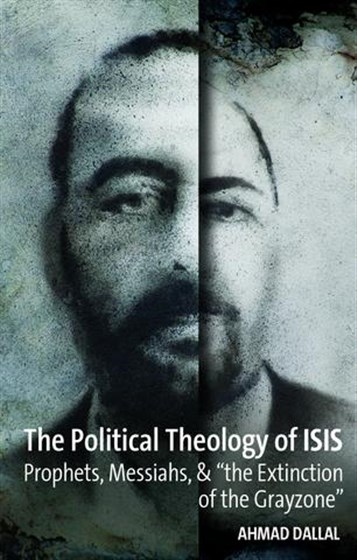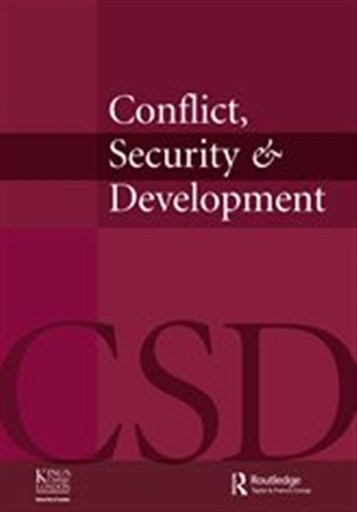Ahmad Dallal, The Political Theology of ISIS: Prophets, Messiahs, & "the Extinction of the Grayzone”. Washington DC: Tadween Publishing, 2017.
Jadaliyya (J): What made you write this book?
Ahmad Dallal (AD): Much has been written about ISIS. Most studies address specific aspects of the movement’s activities, but fall short of identifying the overall ISIS project that is used to homogenize and integrate the diverse constituencies targeted by ISIS. In this essay I try to identify the key features of the larger project of ISIS, its political theology. To my mind, a radical critique of the ISIS project cannot rely on simply highlighting the weakness of the legal interpretations used by ISIS, or the price ISIS exacts in human life and suffering, but must interrogate the larger project within which the ISIS legal arguments are embedded, and within which its violence is justified.
J: What particular topics, issues, and literatures does the book address?
AD: The essay addresses the political theology of ISIS, that is, the distinctive feature of the ISIS political and religious project. Among other things, the essay addresses the question of religiosity of ISIS; the genealogy and architecture of the religious and political concepts deployed by ISIS; the differences between ISIS and other contemporary jihadi movements; and the way ISIS justifies its actions. The essay draws on the literature that theorizes the global Islamic strategy of jihad, including writings shared with other jihadi movements, as well as writings specific to ISIS.
J: How does this book connect to and/or depart from your previous work?
AD: I have written previously on Islamic thought and movements, but while my earlier work is on the pre-modern period, this essay deals with a contemporary movement.
J: Who do you hope will read this book, and what sort of impact would you like it to have?
AD: Students of modern Islamic movements; contemporary historians and political scientists. The general public, as well as anyone interested in contemporary events.
J: What other projects are you working on now?
AD: I am currently finishing a book on traditions of reform in eighteenth-century Islamic thought.
Excerpt from the book:
Just a few years after their beginning, it now appears that the bold hope engendered by the Arab uprisings is being replaced by fear of the seemingly endless slide toward utter devastation and senseless cruelty. More than any other actor in the contemporary Arab political landscape, ISIS embodies this fear. In a very real sense, ISIS usurped the uprisings’ revolutionary project and aborted many of its promises and achievements. In this sense, it acts as a counter-revolutionary force, but ISIS also appears to be one of the most effective forces poised to undermine the former order that triggered the uprisings, and this potency is of course evidenced by the fact that the whole world is trying to mobilize to defeat or contain it.
…
Like all revolutions, the Arab popular uprisings calling for the departure of the heads of states (the famous irhal) can only be illegal from the perspective of the standing legal orders (whether national or international), because a revolution is an experience of authenticity, and not only (and not necessarily) a remedy for injustice or the enforcement of rights. At moments of revolution, legality and legitimacy are not the same; legitimacy at such moments is asserted in the name of a historically contingent “sovereignty” constituted through the revolutionary act itself, but this legitimacy does not automatically result in a new reality; rather, it opens the door to multiple realities and imagined possibilities. Democratic transition is one such possibility, but so is ISIS (and many things in between).
…
ISIS deploys violence as a way to eliminate the grayzone, to polarize society and recruit marginalized Muslims and convince them to join the Islamic state. According to ISIS, “the time had come for another event— magnified by the presence of the khilafa on the global stage—to further bring division to the world and destroy the grayzone everywhere.” In fact, the ultimate litmus test to judge a jihadi group is its willingness to divide the world into two camps: the camp of Islam and the crusaders or the camp of kufr. ISIS, of course, insists that the caliphal State exclusively embodies the camp of Islam, and laments the wide support by various Muslim and non-Muslim groups of the “cause of oppressed Muslims” in Syria, that implies non-Muslim sympathy with the cause of Muslims, thereby slowing the desired “withering of the grayzone.”
…
The primary identity and legitimating factor of this new Islamic order, and one that distinguishes it from its other Islamic rivals, is the fact of the State. For this reason, in addition to the war against regimes and non-Muslims and the war against the Shi‘a, the largest ideological battle that ISIS fights is against similar jihadi groups who do not submit to it. In fact, the majority of the writings of the Islamic state, and a significant portion of their fighting, are directed against rival jihadis. According to ISIS, “nothing has delayed victory, and delays it now, more than these [rival jihadi] organizations, because they are the cause of division and disagreement that erode strength.” Also, it would seem that ISIS feels no great need to justify its strategy to the types of Muslims it wishes to recruit: Muslims who already buy into the idea of global jihad against non-Muslims and so called apostate regimes. However, it is much harder to explain to such Muslims why they should fight under the banner of ISIS and not the older al-Qa‘ida.
…
The caliphate of ISIS is predicated on a model of justice founded on absolute obedience to the self-declared caliph, who happens to prevail, and dissociation from everybody and everything that does not submit to him. Despite superficial attempts to ground its actions in the law, for ISIS the apocalyptic establishment of the caliphate endows the caliph with the ultimate sovereignty that demands unquestioning obedience. The caliph fulfills his role by utilizing all the power at his disposal to “compel people to do what the Shari‘a (Allah’s law) requires of them concerning their interests in the hereafter and worldly life.” This blind and unqualified obedience to the commanding authority of the state and its head turns cruelty and brutality into the very act of worship.
…
However, ISIS does more; it twists the Islamic civilizational project and subjugates God’s love and mercy to His justice. It reduces God’s sovereignty to superficial and mechanical renditions of the law, and it makes sacrifice of self and other an aim in itself. Which brings us back full circle to the political theology of ISIS, and the legitimacy it claims at a formative foundational moment where sovereignty derives from God himself and not just from God’s laws.
…
The author of Idarat al-Tawahhush argues that God sends prophets to alert people to the consequences of their actions; persistence in disobedience to God, and in discarding the guidance brought by prophets, leads to the spreading of corruption, and results in the unleashing of God’s wrath on the unbelievers even if they number in the millions; and God then causes enormous suffering befitting of His might and of His wrath over the violation of his sanctions, a torment of suffering that restores the justice that is absent from earth. As such, jihad becomes “more merciful to humanity than directly bearing the enormous torment of God. This is why God ordained that those who deserve punishment shall be tormented at the hands of the believers.”
This is a twisted model of prophetic justice, one which contends that God inflicts suffering on a large scale, and that his mercy and compassion are neither through an embodied God who suffers on behalf of humanity, nor through prophets who guide and remind, but through jihad, which afflicts limited pain to avert larger suffering. However, ISIS goes further and combines the immediacy of prophetic justice with a messianic justice that, at the moment of glorifying power and cruelty, celebrates failure as a step towards the return of Jesus and the coming of the mahdi. This opportunistic combination of models of prophetic justice and messianic justice alleviates the burden of having to deliver real justice. ISIS, therefore, sets up a model in which it is not accountable for any results, and without accountability, the ability to posit answers to all possible questions with unyielding certitude requires elimination, as it were, of any doubt and uncertainty. Without doubt and uncertainty, there can be no moral consciousness; hence, the production of a political theology that theorizes ruthlessness and fear.
[Excerpted from The Political Theology of ISIS, with permission of the author (c) 2017.]
















